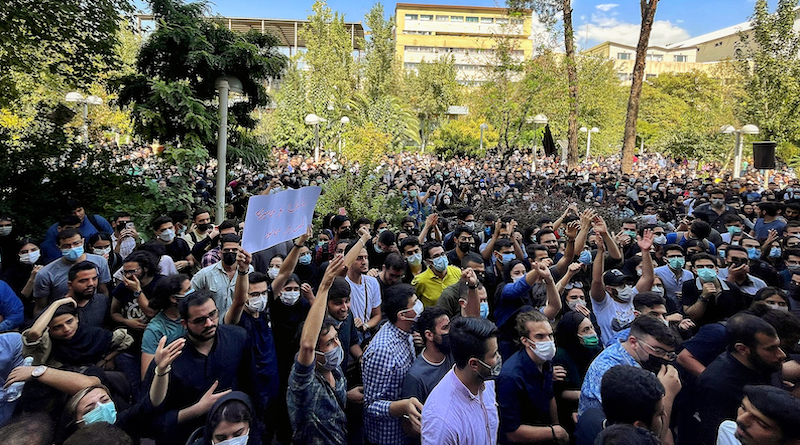Salute The Courage Of Iran’s Female Protesters – OpEd
By Arab News
By Dr. Azeem Ibrahim*
Iran’s leaders would prefer it if their people chanted “Death to America,” but instead protesters in towns and cities across the country are calling for “Death to the dictator.”
The spark, as in so many protest and revolutionary movements in history, was the murder of a young woman. Mahsa Amini, 22, from Kurdistan province, was traveling with her family to Tehran when she was picked up by the regime’s religious police for being insufficiently “modest” in her dress.
She was beaten by police in a van, and later her family were told she was in hospital. After a time in intensive care, in a coma, she died just before her 23rd birthday.
Amini’s treatment would cause outrage any country, but it has especial pertinence in Iran. For all of the show of the clerical government, which claims to be a modernising participant in the normal course of international affairs, in practice Iran is a place ruled by fear, in which women are obvious second-class citizens.
Marked out by enforced customs of dress, forbidden to participate in society except on the regime’s terms, women suffer most of all Iranians. In a state led by the clerical direction of the Supreme Leader, enforced by the Islamic Revolutionary Guard Corps, there is no space for reform within the system.
In other countries (Sudan most notably in the past few years) women have been at the heart of protest movements that shake tyrannies. In Iran, the same appears to be true. Women are leading crowds of protesters, burning the form of veil they are forced by the state to wear, and defying the authority of the state to dictate how they must live.
Their bravery has captured international attention, and the hearts of many around the world — which makes the following hard to write: they will face immense resistance from a regime that will not permita reform movement to spring up without challenge. Sadly, violent reprisal is inevitable.
The Iranian state has form using open violence on its own streets, and will not stop at killing protesters. In waves of protests since 2019, often provoked by increases in food and fuel prices, the regime has killed thousands of demonstrators. The watchword of the state: do whatever necessary to drive people from the streets and send them back, fearful, into their homes.
In Iran’s campaign of regional domination across the Middle East, it has perfected its tactics. In response to demonstrations in Iraq and Lebanon, not to mention Syria, Iranian-sponsored militias have used savage reprisals against local dissent.
It is not my intention to make the protesters lose heart, or to tell them their struggle is in vain. It is not, and living in Iran as they do, seeing what the clerical regime does to those who protest, by now they know well the costs of dissent and demonstration.
That they take to the streets regardless shows admirable courage, and is profoundly to the credit of those who risk their lives to protest against unjust laws enforced by a hated clergy and the Revolutionary Guards.
Big changes are possible in Iran — not caused by the ordinary rhythms of its politics, but by the movement of time and chance. Reporting from credible outlets indicates that the Supreme Leader, Ayatollah Ali Khamenei, may be gravely ill. He has ruled since the death of Ruhollah Khomeini, and has pioneered and led decades of repression. If he were to die, Iran would have a small prospect of change. Perhaps the next supreme leader would be less inclined to injure and to kill.
But the protesters on the streets of Iran do not expect this. All they know is that the current laws are brutal and unjust, enforced by cruel men who kill first because they can, and kill again to keep their positions.
Iran’s female-led protesters know they cannot count on anything but their own actions to bring change to the country. That they choose to act in that knowledge says volumes for their courage, and for what people will risk to change the intolerable.
• Dr. Azeem Ibrahim is the director of special initiatives at the Newlines Institute for Strategy and Policy in Washington D.C. and author of “The Rohingyas: Inside Myanmar’s Genocide” (Hurst, 2017). Twitter: @AzeemIbrahim

